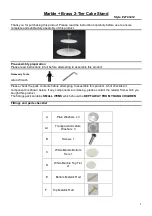
1. Line up the index mark on the
back of the 3D Lens in a Cap
9005 with the index mark on
the camera body and attach it
to the camera.
2. This lens is for use with sub-
frame Single Lens Reflex
(SLR) cameras with the image
sensor format stated on the
box. Mostly, these will be
digital cameras. If used with a
full-frame camera, the surplus
image area will have to be
cropped off.
3. This is a manual lens. There
are no electronics. Turn off
auto-focusing before using the
lens. Aperture priority auto-
exposure should work. If not,
turn that off as well.
4. Usage: First select aperture
using the aperture slider. Three
click stop apertures (f11/f16/
f22) are provided. Set focus
from 1.5 m (5 ft.) to infinity.
5. The 3D Lens in a Cap 9005
works with TTL flash, Aperture
Priority (AV) or Program (P)
mode exposure on many cam-
eras. For manual control use a
light meter or exposure chart.
6. The 3D Lens in a Cap 9005
has no auto diaphragm, so
the viewfinder image darkens
when f/22 is chosen. This al-
lows the user to judge depth
of field, and has no adverse
effect on the final picture.
7. This depth of field scale gives
an estimated distance range in
which all objects will be sharp
for a given aperture.
A
D
f/11
f/16
f/22
1.5m
1.2 - 2.5m
1.1 - 2.6m
1 - 3.5m
2.2m
1.5 - 4m
1.4 - 6m
1.2 - 10m
5m
2.8m - ∞
2m - ∞
1.7m - ∞
∞
5m - ∞
4m - ∞
2.5m - ∞
D - Distance A - Aperture
If the lens is set to f/11 and
focused at 5m, depth of field
will be 2.8m to infinity, which is
the optimal pan-focus con-
figuration for 9005 style 3D
photography.
8. Depth of field is very useful
for stereo photography. High
image sensor sensitivity com-
pensates for small aperture.
ISO 200-400 will give excellent
results. Loreo 3D lenses in the
right hands can take beautiful
3D photographs. Maximize the
potential of your Loreo 3D lens
by using a monopod and a
high quality modern DSLR.
9. Make sure the lens is aligned
with the camera on the hori-
zontal. This can affect the ver-
tical alignment of the 3D image
pair.
10. The two 58 mm threads on the
front can be used for mounting
lightweight filters, lens hoods,
wide angle lenses and tele
lenses. Attachments should be
selected and used with care so
as not to damage the thread.
Converter lenses should be
matched at purchase.
11. In selecting accessories for the
lens make sure that the maxi-
mum outer diameter does not
exceed 85 mm. The minimum
inner diameter should not be
less than 44mm for 4:3 format
9005 lenses.
For APS-C format, there are
very few tele converters with
a sufficient inner diameter to
avoid vignetting. Photos taken
with tele converters on APS-C
format 9005 lenses will most
likely need to be cropped after-
wards.
Since the wide stereo base
of the 9005 is suitable for 3D
photography at mid-distance
(5m or more away), users can
multiply the tele effect simply
by cropping the image pair.
Tele converters can make it
more convenient, but are not
essential.
LOREO
3D Lens in a Cap 9005
APS-C format (Model 9005A)
Operating instructions
(please refer to your camera instruction
manual for changing your lens)
Specifications
Model
: LA9005A
Lens Type
: 3D, parallel view, all manual, no electronics
Lens system
: dual, 40 mm, f11-22, 2 elements, plastic polymer
composite
Stereo Base (pitch)
: 90mm
Sensor Format
: ~ (22 - 24) x (14.5 - 16) mm APS-C subframe digital
SLR sensor - equivalent to 1.5-1.6x crop
Diaphragm
: Twin Blade, f11, f16, f22 with click stops
Focus adjustment
: Continuous focusing slider
Focusing range
: 1.5m to infinity.
Accessory lens
: 58 mm filter thread. Maximum outer diameter 86 mm.
Ideal minimum rear lens diameter 44 mm. Suitable for wide angle and
tele converters. 52 mm accessories can be used with a stepping ring.
Special Features
: Focus coupled Parallax Compensation. Parallax
feedback focus aid.
Function
: Gives an APS-C format digital SLR camera 3D capabilities
using normal processing. Retains many of the features of an SLR cam-
era, such as through the lens viewing, auto exposure, TTL flash.
Digital SLR body mounts
: Pentax K, Canon EOS, Nikon N, Minolta
AF, Sony Alpha, Samsung GX (Pentax K), Fuji Finepix S-series Pro (N).
Please also check the DSLR compatibility section.
Aperture
Scale
Aperture
Slider
58 mm Filter Threads
Focusing
Scale
Focusing
Slider






















